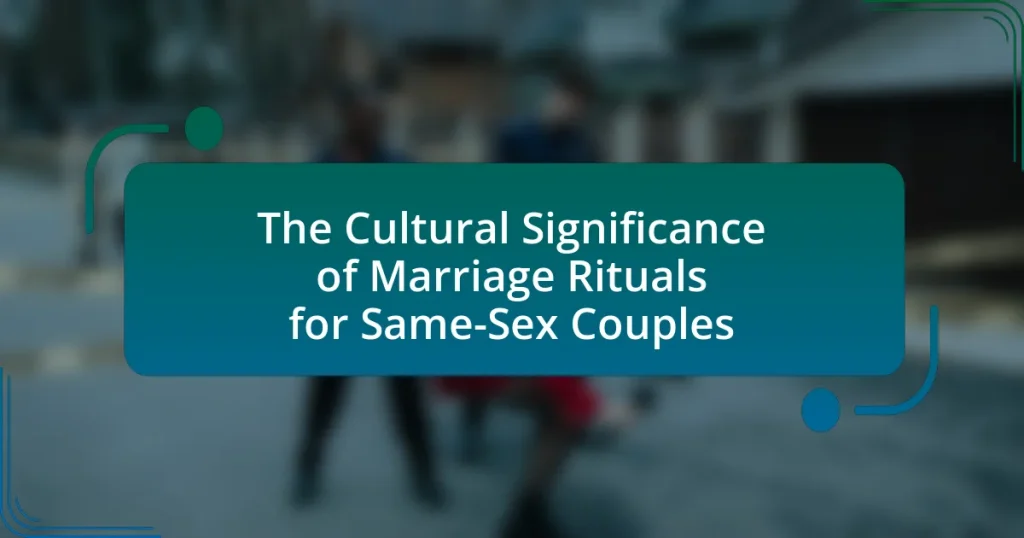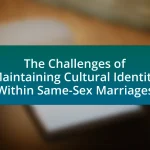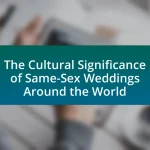The article examines the cultural significance of marriage rituals for same-sex couples, highlighting their role in promoting recognition, acceptance, and equality within society. It discusses how these rituals differ from those of heterosexual couples, emphasizing personalization and inclusivity. The article also explores historical contexts, cultural influences, and the impact of legal recognition on these rituals, as well as the challenges faced by same-sex couples. Additionally, it addresses the psychological benefits of participating in marriage rituals and the resources available for couples to create meaningful ceremonies that reflect their identities.
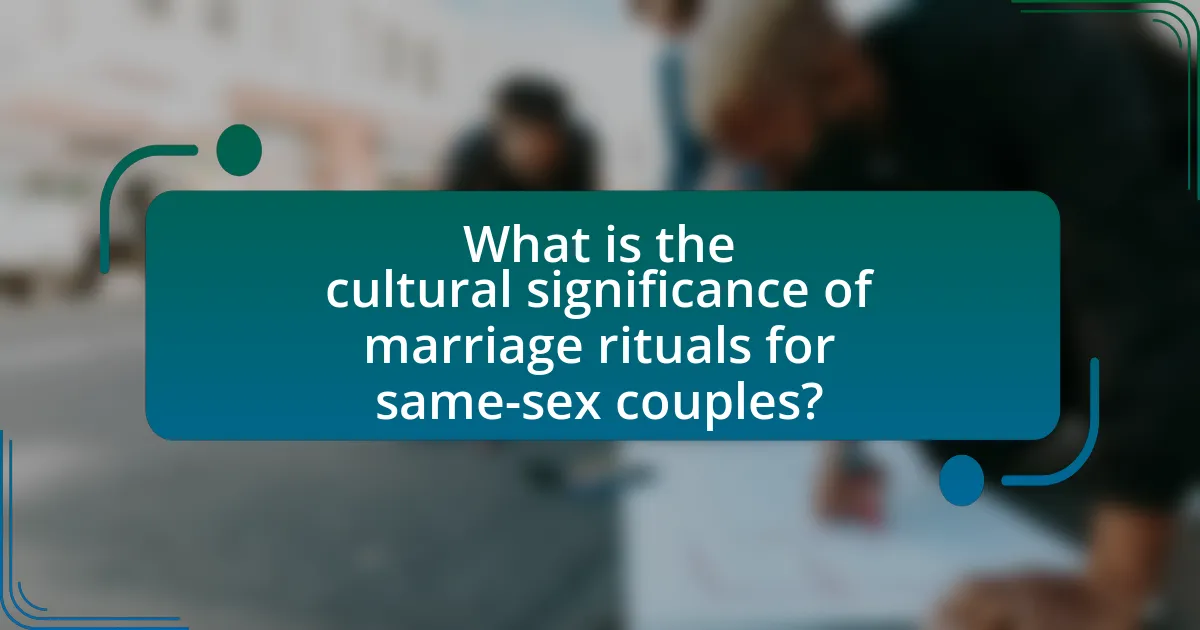
What is the cultural significance of marriage rituals for same-sex couples?
Marriage rituals for same-sex couples hold significant cultural importance as they symbolize recognition, acceptance, and equality within society. These rituals serve to affirm the legitimacy of same-sex relationships, challenging traditional norms and fostering inclusivity. For instance, the legalization of same-sex marriage in various countries has led to the establishment of unique wedding traditions that reflect the couple’s identity and values, further embedding these practices into the cultural fabric. Research indicates that such rituals not only enhance social visibility for LGBTQ+ individuals but also contribute to broader societal shifts towards acceptance, as evidenced by increased support for LGBTQ+ rights following the adoption of marriage equality laws in nations like the United States and Canada.
How do marriage rituals differ for same-sex couples compared to heterosexual couples?
Marriage rituals for same-sex couples often differ from those of heterosexual couples in terms of inclusivity and personalization. Same-sex couples frequently create unique ceremonies that reflect their identities and experiences, as traditional rituals may not fully encompass their relationships. For instance, while heterosexual couples might follow established customs like the exchange of rings or specific religious rites, same-sex couples may opt for alternative symbols or rituals that resonate more with their journey, such as incorporating LGBTQ+ cultural elements or personal vows that emphasize their commitment in a way that feels authentic to them. This personalization is supported by studies indicating that same-sex couples prioritize meaningful expressions of love and commitment, often leading to more customized and diverse wedding experiences compared to the more standardized practices seen in heterosexual marriages.
What historical contexts have shaped these rituals for same-sex couples?
Historical contexts that have shaped rituals for same-sex couples include the evolution of societal attitudes towards homosexuality, legal recognition of same-sex relationships, and cultural influences from various movements. For instance, the Stonewall Riots in 1969 marked a significant turning point in LGBTQ+ rights, leading to increased visibility and acceptance, which in turn influenced the development of unique marriage rituals. Additionally, the legalization of same-sex marriage in numerous countries, starting with the Netherlands in 2001, has prompted the creation of formalized wedding ceremonies that reflect both traditional and contemporary values. These contexts demonstrate how historical events and legal advancements have directly impacted the rituals and practices surrounding same-sex unions.
How do cultural backgrounds influence the marriage rituals of same-sex couples?
Cultural backgrounds significantly influence the marriage rituals of same-sex couples by shaping their traditions, values, and societal acceptance. For instance, in cultures with strong religious or conservative views, same-sex marriage may be less accepted, leading couples to adapt their rituals to be more discreet or to seek alternative ceremonies that align with their cultural context. Conversely, in more progressive cultures, same-sex couples may incorporate traditional elements from their heritage, such as specific attire or family involvement, into their ceremonies, reflecting both their cultural identity and their commitment to each other. Research indicates that cultural factors, including ethnicity and religion, play a crucial role in determining how same-sex couples navigate their marriage rituals, often resulting in unique blends of traditional and modern practices that honor their backgrounds while celebrating their union.
Why are marriage rituals important for same-sex couples?
Marriage rituals are important for same-sex couples because they provide a formal recognition of their commitment and love, similar to heterosexual couples. These rituals serve to affirm their relationship in a societal context that has historically marginalized LGBTQ+ identities. Research indicates that participating in marriage rituals can enhance relationship satisfaction and stability, as evidenced by a study published in the Journal of Marriage and Family, which found that same-sex couples who engage in formal ceremonies report higher levels of relationship quality. Additionally, marriage rituals can foster community support and acceptance, helping to combat stigma and discrimination faced by same-sex couples.
What role do marriage rituals play in the recognition of same-sex relationships?
Marriage rituals serve as a formal acknowledgment of same-sex relationships, providing social validation and legal recognition. These rituals often symbolize commitment and partnership, similar to their role in heterosexual unions, thereby fostering acceptance within communities. For instance, in countries where same-sex marriage is legalized, such as the United States post-Obergefell v. Hodges (2015), marriage ceremonies have become vital in affirming the legitimacy of these relationships, contributing to broader societal acceptance. Additionally, marriage rituals can enhance the visibility of same-sex couples, challenging traditional norms and promoting equality.
How do these rituals contribute to community acceptance and support?
Marriage rituals for same-sex couples foster community acceptance and support by publicly affirming their relationships and promoting visibility. These rituals create shared experiences that encourage dialogue and understanding among community members, thereby reducing stigma. For instance, studies have shown that public celebrations of same-sex marriages can lead to increased acceptance in communities, as they challenge traditional norms and highlight the legitimacy of diverse relationships. This visibility often results in greater social cohesion and support networks, as families and friends come together to celebrate, reinforcing the idea that love and commitment are universal values.
What challenges do same-sex couples face in their marriage rituals?
Same-sex couples face significant challenges in their marriage rituals, primarily stemming from societal stigma and legal barriers. These couples often encounter discrimination and lack of acceptance from family, friends, and communities, which can lead to emotional distress and isolation during their wedding planning and ceremonies. Additionally, in regions where same-sex marriage is not legally recognized, couples may struggle with the legitimacy of their union, impacting their ability to access legal rights and benefits associated with marriage. Research indicates that same-sex couples frequently navigate complex family dynamics, as some relatives may refuse to participate in or acknowledge the marriage, further complicating the ritual experience.
How do legal restrictions impact the ability to perform marriage rituals?
Legal restrictions significantly limit the ability to perform marriage rituals, particularly for same-sex couples. These restrictions can include laws that prohibit same-sex marriage, which directly prevents couples from legally formalizing their union through traditional rituals. For instance, in countries where same-sex marriage is illegal, couples may face legal consequences for attempting to hold a marriage ceremony, thus undermining the cultural and social significance of such rituals. Furthermore, even in regions where same-sex marriage is recognized, additional legal barriers, such as lack of recognition of foreign marriages or restrictions on adoption, can further complicate the ability to engage in meaningful marriage rituals. This legal landscape not only affects the couples’ rights but also impacts their families and communities, as the absence of legal recognition can diminish the perceived legitimacy of their relationships within society.
What societal attitudes affect the celebration of marriage rituals for same-sex couples?
Societal attitudes that affect the celebration of marriage rituals for same-sex couples include acceptance, stigma, and legal recognition. Acceptance of same-sex marriage has increased significantly in many regions, with a 2021 Gallup poll indicating that 70% of Americans support same-sex marriage, reflecting a shift towards inclusivity. Conversely, stigma persists in certain communities, where traditional views on marriage may lead to discrimination and exclusion from mainstream celebrations. Legal recognition also plays a crucial role; in countries where same-sex marriage is legalized, such as Canada and the Netherlands, celebrations are more widely accepted and integrated into societal norms, enhancing the visibility and legitimacy of these rituals.
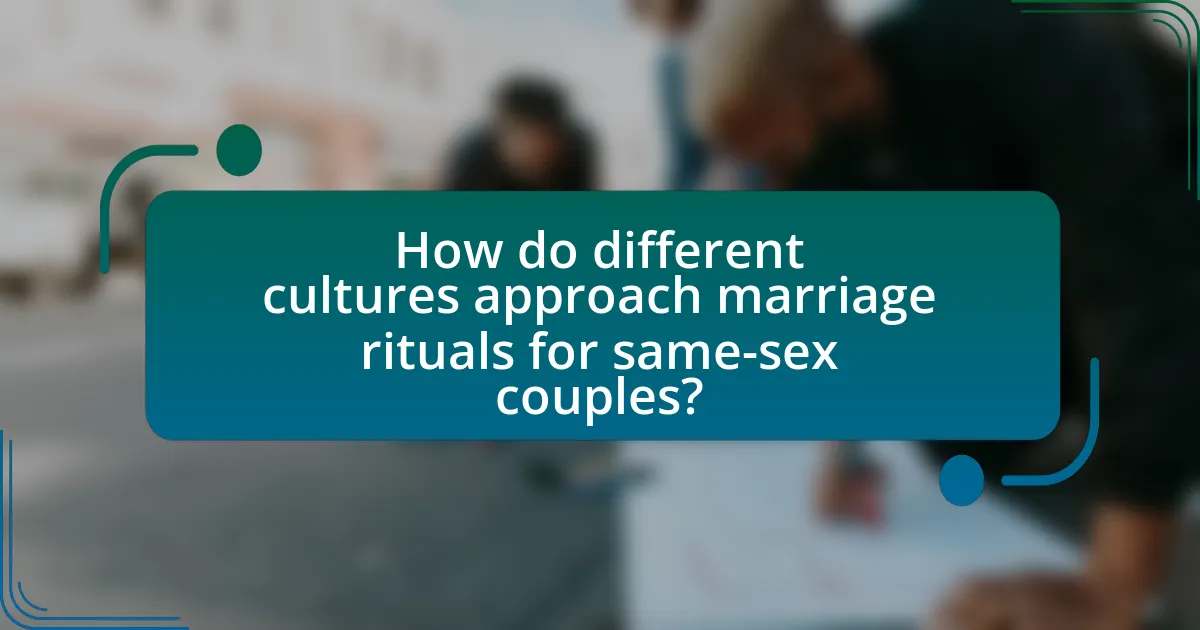
How do different cultures approach marriage rituals for same-sex couples?
Different cultures approach marriage rituals for same-sex couples in varied ways, reflecting their unique social norms and legal frameworks. In countries like the Netherlands and Canada, same-sex marriage is legally recognized, allowing couples to participate in traditional wedding ceremonies similar to heterosexual couples, complete with legal rights and societal acceptance. Conversely, in cultures where same-sex relationships are stigmatized or illegal, such as in parts of Africa and the Middle East, same-sex couples may resort to private ceremonies or symbolic rituals that lack legal recognition, often facing significant societal challenges. For instance, in some Indigenous cultures in North America, two-spirit individuals may have historically been celebrated through specific rituals that honor their identity, showcasing a more inclusive approach to marriage. These diverse practices highlight the intersection of cultural beliefs, legal recognition, and societal attitudes towards same-sex unions across the globe.
What are some examples of unique marriage rituals for same-sex couples around the world?
Unique marriage rituals for same-sex couples around the world include the “Handfasting” ceremony in Scotland, where couples bind their hands together to symbolize their union. In Mexico, the “Lazo” ritual involves placing a rope or cord around the couple to signify their commitment. In India, some same-sex couples adopt traditional Hindu wedding customs, such as the “Saptapadi,” where they take seven steps together, representing their vows. Additionally, in the United States, some couples participate in “Rainbow Weddings,” which incorporate LGBTQ+ symbols and themes into traditional ceremonies. These rituals reflect cultural adaptations and the significance of love and commitment in diverse societies.
How do indigenous cultures incorporate same-sex marriage into their traditions?
Indigenous cultures incorporate same-sex marriage into their traditions through various practices that recognize and celebrate diverse sexual orientations. For example, many Native American tribes acknowledge Two-Spirit individuals, who embody both masculine and feminine qualities, and often participate in unique marriage ceremonies that honor their identities. Historical accounts indicate that these ceremonies can include rituals such as the sharing of gifts, communal feasting, and spiritual blessings, which affirm the couple’s union within the community. This integration of same-sex marriage into traditional practices highlights the cultural acceptance and significance of diverse relationships in indigenous societies.
What variations exist in marriage rituals among different religious communities for same-sex couples?
Variations in marriage rituals for same-sex couples exist across different religious communities, reflecting diverse beliefs and practices. For instance, some Christian denominations, such as the United Church of Christ and the Episcopal Church, perform same-sex marriage ceremonies that include traditional elements like scripture readings and blessings. In contrast, certain Jewish communities, particularly Reform and Reconstructionist branches, have developed unique rituals that incorporate traditional Jewish wedding customs, such as the chuppah and the breaking of the glass, adapted for same-sex couples. Additionally, some Buddhist communities may conduct ceremonies that emphasize love and commitment without strict adherence to traditional marriage structures. These variations highlight the evolving nature of religious practices in response to changing societal norms regarding same-sex relationships.
How do contemporary movements influence marriage rituals for same-sex couples?
Contemporary movements significantly influence marriage rituals for same-sex couples by promoting inclusivity and challenging traditional norms. These movements advocate for equal rights and recognition, leading to the incorporation of diverse cultural practices and personalized elements in same-sex wedding ceremonies. For instance, the legalization of same-sex marriage in various countries has encouraged couples to express their identities through unique rituals that reflect their values and experiences, such as incorporating LGBTQ+ symbols or community involvement. Research indicates that these movements have reshaped societal perceptions, making marriage rituals more representative of varied sexual orientations and fostering acceptance within broader cultural contexts.
What role do LGBTQ+ advocacy groups play in shaping these rituals?
LGBTQ+ advocacy groups play a crucial role in shaping marriage rituals for same-sex couples by promoting inclusivity and visibility within these ceremonies. These organizations work to challenge traditional norms and advocate for the recognition of diverse expressions of love and commitment, thereby influencing the development of rituals that reflect the values and identities of LGBTQ+ individuals. For instance, advocacy groups have successfully lobbied for legal recognition of same-sex marriages, which has led to the incorporation of unique elements in wedding ceremonies that celebrate LGBTQ+ culture, such as the inclusion of non-binary roles or the use of specific symbols that resonate with the community. This influence is evident in the growing acceptance and adaptation of marriage rituals that honor the distinct experiences of same-sex couples, fostering a sense of belonging and affirmation within the broader societal context.
How has social media impacted the visibility and evolution of same-sex marriage rituals?
Social media has significantly enhanced the visibility and evolution of same-sex marriage rituals by providing a platform for sharing personal stories and experiences. This increased visibility has allowed same-sex couples to showcase their unique wedding ceremonies, fostering a sense of community and acceptance. For instance, platforms like Instagram and Facebook have enabled couples to share images and videos of their weddings, which has contributed to the normalization of same-sex marriage in society. According to a study published in the Journal of Homosexuality, social media serves as a vital tool for LGBTQ+ individuals to express their identities and celebrate their relationships publicly, thereby influencing cultural perceptions and acceptance of same-sex marriage rituals.
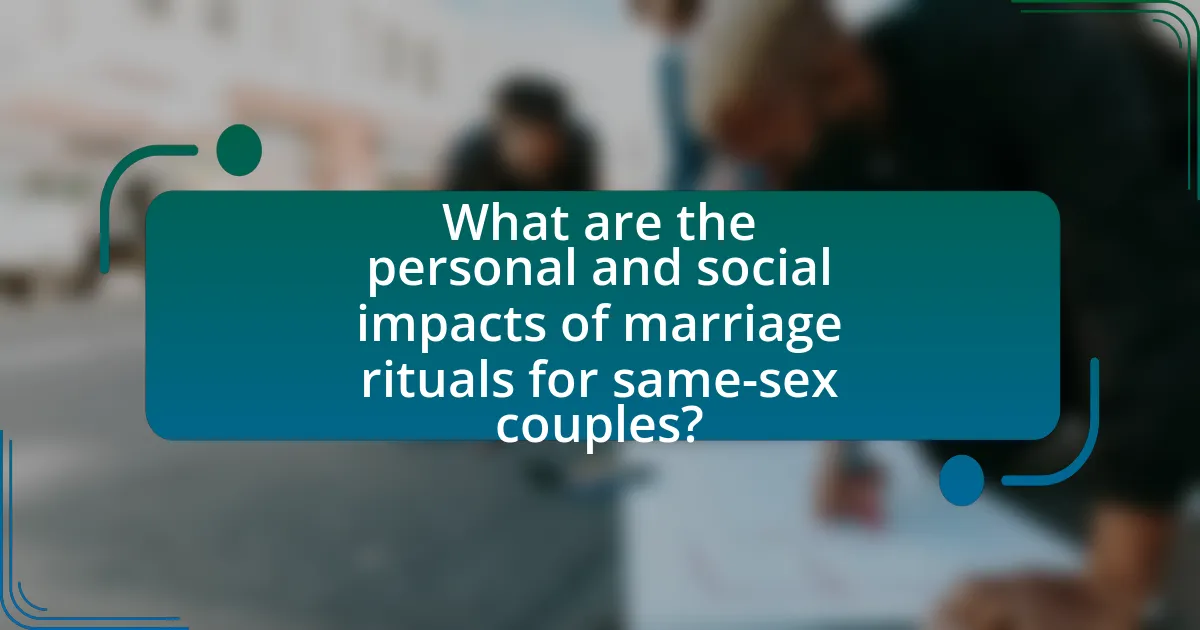
What are the personal and social impacts of marriage rituals for same-sex couples?
Marriage rituals for same-sex couples have significant personal and social impacts, including enhanced emotional well-being and increased societal acceptance. Personally, these rituals often provide a sense of validation and recognition of their relationship, contributing to improved mental health and relationship satisfaction. Socially, the visibility of same-sex marriage rituals can challenge traditional norms and promote inclusivity, fostering greater acceptance within communities. Research indicates that public celebrations of same-sex marriages can lead to shifts in public attitudes, as seen in studies showing increased support for LGBTQ+ rights following high-profile same-sex weddings.
How do marriage rituals affect the personal identity of same-sex couples?
Marriage rituals significantly enhance the personal identity of same-sex couples by providing a formal recognition of their relationship and affirming their commitment to one another. These rituals often serve as a public declaration of love and partnership, which can strengthen the couple’s sense of belonging within their community. Research indicates that participating in marriage rituals can lead to increased self-esteem and social acceptance for same-sex couples, as they experience validation from family, friends, and society. For instance, a study published in the Journal of Marriage and Family found that same-sex couples who engaged in wedding ceremonies reported higher levels of relationship satisfaction and personal identity affirmation compared to those who did not participate in such rituals. This underscores the importance of marriage rituals in shaping and reinforcing the identities of same-sex couples within a cultural context that historically marginalized their relationships.
What psychological benefits do same-sex couples experience from participating in marriage rituals?
Same-sex couples experience several psychological benefits from participating in marriage rituals, including enhanced emotional well-being, increased relationship satisfaction, and a strengthened sense of identity. Engaging in marriage rituals provides a formal recognition of their commitment, which can lead to improved mental health outcomes, such as reduced anxiety and depression. Research indicates that public acknowledgment of their relationship through marriage rituals fosters a sense of belonging and validation, which is crucial for psychological resilience. A study published in the Journal of Marriage and Family found that same-sex couples who participated in wedding ceremonies reported higher levels of relationship quality and personal happiness compared to those who did not engage in such rituals. This highlights the significant role that marriage rituals play in affirming their love and commitment, ultimately contributing to their overall psychological health.
How do these rituals strengthen relationships within the LGBTQ+ community?
Marriage rituals within the LGBTQ+ community strengthen relationships by fostering a sense of belonging and shared identity among individuals. These rituals create opportunities for couples to publicly affirm their love and commitment, which can enhance emotional bonds and mutual support. Research indicates that participation in such rituals can lead to increased relationship satisfaction and stability, as evidenced by a study published in the Journal of Marriage and Family, which found that same-sex couples who engaged in formal ceremonies reported higher levels of relationship quality compared to those who did not. Additionally, these rituals often involve community participation, reinforcing social networks and support systems that are crucial for emotional well-being.
What practical considerations should same-sex couples keep in mind when planning their marriage rituals?
Same-sex couples should consider legal recognition, cultural inclusivity, and personal significance when planning their marriage rituals. Legal recognition varies by location, so couples must ensure their marriage is valid in their jurisdiction, which may involve understanding local laws and obtaining necessary licenses. Cultural inclusivity is important, as couples may want to incorporate traditions from both partners’ backgrounds, ensuring that the ceremony reflects their identities and values. Personal significance involves selecting rituals that resonate with the couple’s relationship, such as vows that express their unique commitment. These considerations are essential for creating a meaningful and legally recognized marriage ceremony.
What resources are available for same-sex couples to create personalized marriage rituals?
Same-sex couples can access various resources to create personalized marriage rituals, including online platforms, local LGBTQ+ organizations, and wedding planners specializing in inclusive ceremonies. Websites like Offbeat Bride and The Knot offer inspiration and guidance tailored to same-sex couples, while organizations such as the Human Rights Campaign provide resources and support for planning inclusive weddings. Additionally, many wedding planners now focus on creating customized experiences that reflect the unique identities and values of same-sex couples, ensuring that their rituals are meaningful and personal.
How can same-sex couples navigate family dynamics during their marriage rituals?
Same-sex couples can navigate family dynamics during their marriage rituals by establishing open communication and setting clear boundaries with family members. Open dialogue allows couples to express their needs and expectations, fostering understanding and support from relatives. Additionally, involving family members in the planning process can create a sense of inclusion, which may ease tensions. Research indicates that when families are engaged in the wedding planning, they are more likely to accept and support the couple, as seen in studies highlighting the positive impact of family involvement on relationship satisfaction.
